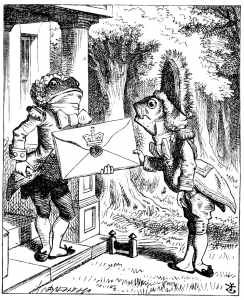Inspired by real events, A story about an early morning wake up call in which I explain a Nine Step Sales Process one more time, along with why non-professionals give real sales professionals a bad name.
My cell phone went off at 6:00 AM, and despite the fact that I had been up until 3:00 AM, working on my new website, I answered it. After all, I only use my cell phone for business. I also hate to admit it, but in my groggy state, I forgot to give a professional greeting. You know. “Good morning, this is Lynn with Whackadoodle World. How can I help you?” No, I merely said, “Hello.”
On the other end was a very nice, eager, young voice. “Hi, I’m M—- from C——, and I noticed that you signed up for our service yesterday, so I am calling to see how we can help you grow your business.”
Okay, I can give him an A+ on the second step in the persuasion process, Rapport. He had told me his name. He had introduced his company. He had explained why he was calling. His voice was upbeat and inviting, but he had forgotten to complete the process. Or perhaps he didn’t know the process because if he did, he would have known to add a open ended question designed to know how I was feeling about his call. Something as simple as, “How are you today?”
If he had asked “How are you today?” he might have learned that he was dealing with a grumpy choleric after only three hours of sleep, living in a different time zone, who had taught sales for ten years, and who was not afraid of telling people what she thought. He might have also been able to respond more effectively, with something like, “I am so sorry. I didn’t realize you were in a different time zone. When would it be a better time for me to call?”
At which point I probably would have told him that since I was already awake, he could go ahead, but since he didn’t ask how I was, he didn’t learn how I was, and I simply let him talk.
I have to give him an F- on the first step of the process, Choose your battles, because he knew nothing about me before trying to persuade me. I knew almost immediately that he’d just gotten my phone number from the sign up service the night before. He hadn’t even bothered to google me, or check out my website, before calling. But I let him talk on because of the A+ on rapport.
I also have to admit that his voice was charming, even to my groggy mind. He was so interested in what I was working on, and I wanted to talk about what I was working on. He began asking me questions about my website, skipping entirely the third step, Permission, another F- for him. He never asked, “Would it be okay if I asked a few questions about your website?” He just started asking, still knowing nothing about me. I guess he never learned the power of asking permission.
After permission comes Qualifications; it’s when you ask a potential client open ended questions designed to understand their needs, their motivations, their budget, their fears, their goals, their dreams. This is the most important part of the process because you also have to determine if your product can serve their needs. If your product can’t, you move on. If your product can, you move forward.
During this process, I think that might I give my early morning caller a C, or possibly a C+. After all, he asked me a lot about me, and people always like to talk about themselves. But he lost points because he started selling before I was sold. I guess nobody told him that you should never try to sell anything to anyone until you have an Agreement of Need. And because he was so busy selling, he also missed a few important clues that I was not ready for an agreement of need.
When he mentioned pop-up forms to increase my mailing list, and I said, “Yeah, I know how they work. I hate those things,” he never bothered to ask why I was against pop-up ads for my website, even though I know how effective they are. He just told me how effective they are and kept selling. At this point he was not asking questions. He was just offering advice, never having seen my website, never having read my books. He was just offering me advice without knowing if I agreed.
Agreement of need is simple. You just ask, “So if I understand, you need ______. Am I right?”
Without agreement of need, you have nowhere to go.
Once you have agreement of need, if you have an agreement of need, you move on to Authority.
Authority is just a quick reminder of the company you represent, so that people know that they aren’t dealing with a flimflam artist. You mention how long they’ve been in business. How many satisfied customers they have. That kind of thing.
Then, and only then, do you move to Presentation in which you actually present your solution/product, and if you want your presentation to be effective, you should should consider using feature/benefit/reaction. It simply goes like this: You say, “So one feature of our product that can help you fill your need is ____. The benefit is____. What do you think?
Do you see how simple it is? You mention a feature of a product, explain it’s benefits, then ask if the potential customer agrees.
How does this work? Let’s see how it might have worked on my early morning caller.
He would have said, “One thing we can offer your website are pop-up ads. These ads can increase your mailing list by tenfold. What do you think?”
At this point he might have listened to why I personally don’t like them, and he might have dealt with my concerns before attempting to close without a single agreement. You need at least three agreements before attempting to close, and he attempted a close without having a single agreement.
No, my early morning caller didn’t know how to make a real presentation and went directly from achieving a C+ in qualifications, step four, to trying to close, step eight.
And what a Close it was. He quickly summarized a bunch of stuff that I had not verbally agreed to needing, and then he asked me for my credit card number. He sounded so confident when he asked for it. For some reason that I can’t explain, his confidence really ticked me off.
I tried to tell him why I didn’t want to join at that time. After all, he still had his A+ in Rapport, but then he made the mistake sales professionals should never make. He started to argue and pressure. He stopped listening. If he had listened, and understood how agreement of need works, he would have said, “So if I understand correctly, you aren’t ready to commit, and you want to see how the sixty day trial goes, is that that right?”
At which point, I would have said, “Right.”
At which point he could have closed by asking, “Would it be alright if I checked back with you in fifty-nine days?”
At which point, I would have said, “Sure, but keep in mind the time zone.” I might even have welcomed his call.
But that is not what happened. He stopped listening. He was no longer interested. He just kept talking. I know it was not his fault. He was probably poorly trained and working off a company script. Sales professionals don’t need a script because they understand the process.
I told him four times why I was not interested in signing up over the phone, but he kept pushing, asking me stupid manipulative questions like, “So you don’t want to grow your business?” until I finally told him off. In my choleric, grumpy, early morning way, I said, “This is feeling like a high pressured sales call. Right now, I just want to hang up on you, but I guess I’m too nice. I have told you several times why I am not interested at this time, but you just keep ignoring me. All your pushing is not going to change my mind!”
At this point, he backed off. He even tried to, but didn’t really, apologize. He asked if he could send me information through my email, which he did, so I have to give him an A+ on Follow-up.
I might follow-up myself by sending him this post to see if he learns anything from it. After all, I am a teacher at heart. I wonder if he will follow-up with me as well.
In the meantime, let me remind you of the nine steps in the sales process:
- Know and chose your battles
- Gain Rapport
- Ask Permission
- Qualifications (use questions to identify budget, needs, motivations, problems)
- Agreement of Need
- Authority
- Presentation (using feature/benefit/reaction)
- Close
- Follow-up
One last thing to mention before we go.
The best sales professionals don’t talk much. They spend most of their time listening to real needs and offering real solutions. In fact, being a true sales professional can be an amazing career. You reach out to people, and you ask what and how they are doing. You ask how you can help. If you have no way to help them yet, you ask if you can keep in touch, and then you go on to you reach out to someone else. You build relationships, and people come back again and again for your advice because you are actually filling a need, not just trying to get a credit card number. You know sales and marketing are not the same thing. Marketing is about getting the word out. Sales, when done well, is about filling needs.
I used to tell my sales class that the hardest part of being in professional sales was finding a product you believed in from a company you could trust with a good payment plan. Once you had that, the process would take care of itself, but only if you really understood the process.
My early morning caller just reaffirmed that belief. He works for a good company, or else I would not have signed up for their sixty day trial. He has a good product at a great price. He had the best possible lead because I had signed up for the trial the night before. But in the end, he just came off as wanting my credit card number. He had everything going for him, except a bad script and not understanding the sales process.
____________
If you you enjoyed this post, please leave a comment below. It helps our algorithm.
It would also be great if you shared this post. It also helps our algorithm.
If you would like to join Lynn’s mailing list, or ask a Dear Navigator question click here

You can reach Lynn Marie Sager at
DearNavigator@gmail.com
Author:
- Navigating Life in a Whackadoodle World
- Finding Sense in a Whackadoodle World
- Teaching Logic in a Whackadoodle World
- Navigating Life Through Turbulent Tides
- A River Worth Riding: Fourteen Rules for Navigating Life

